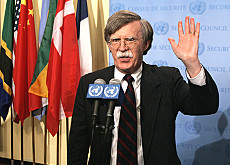
Swiss told to stay out of Iran nuclear crisis

The former American ambassador to the United Nations, John Bolton, has called the so-called "Swiss plan" to end the Iranian nuclear standoff "farcical".
Bolton warned that Switzerland would be better off keeping its nose out of the current crisis between Tehran and the West over Iran’s enrichment of uranium.
In an interview with the “Sonntagszeitung” newspaper, he said the Swiss proposal – which has never been confirmed by the foreign ministry – was nothing more than an illusion.
The plan, according to media reports and diplomatic sources, calls for a simultaneous suspension of Iran’s uranium enrichment programme and international sanctions.
This would then allow for proper negotiations between Tehran and the five permanent members of the UN Security Council as well as Germany. But many observers said this might not happen.
International sanctions have already been slapped on Iran by many countries, including Switzerland, for breaching the nuclear Non-Proliferation Treaty and failed to dent the Islamic Republic’s resolve.
Bolton reckoned that if the Iranians had any interest in a plan, it would only be to buy some time by negotiating.
The biggest fear for many observers is that Iran will use its nuclear programme to develop its own atomic bomb. Some specialists say that the Iranians have mastered the technology for uranium enrichment and could produce enough fissile material needed for a nuclear warhead by next year.
Old plan
Bolton, a leading neo-conservative figure of the Bush administration, said the Swiss plan had already been peddled for some time by the former Swiss ambassador in Teheran, Tim Guldimann.
Bolton added that Guldimann had demonstrated so much anti-American prejudice that Washington had seriously considered asking another country to represent its interests in Iran. Switzerland has represented the US in Tehran since 1979, and Guldimann was there between 1999 and 2004.
The former American diplomat said that he hoped the proposal was not a Swiss government project. There have been a number of meetings between Swiss and Iranian officials in recent months.
Earlier this month, the head of the foreign ministry’s Middle East division, Livia Leu Agosti met the Iranian foreign minister, Manouchehr Mottaki, on the sidelines of an international conference in the Egyptian resort of Sharm el-Sheikh.
Swiss secretary of state Michael Ambühl also travelled to Teheran in February for talks, a few days after his boss, Foreign Minister Micheline Calmy-Rey, discussed the crisis in Bern with Ali Larijani, Iran’s chief nuclear negotiator.
Officially, there has been no discussion of a Swiss plan, only that Switzerland has reminded Tehran that it would prefer a diplomatic outcome to the crisis.
But according to Iranian media reports, Mottaki did show some interest in a Swiss proposal before rejecting the idea this month.
swissinfo with agencies
The United States and Iran have been opposed since 1979 when the Shah was overturned by the Islamic Revolution.
That year, “Islamic students” took control of the US embassy in Tehran and held the personnel hostage for 44 days.
Thanks to Algerian mediation, a negotiated solution was found. the hostages were freed on January 20, 1981 after the Americans agreed to release Iranian assets frozen in the United States and a promise not launch legal proceedings.
The US has had no embassy in Iran since then, with Switzerland representing its interests.
John Bolton has served in several Republican administrations.
He was the interim US Permanent Representative to the United Nations from August 2005 until December 2006, despite his long-standing criticism of the UN.
He resigned from his post in December, realising that the newly elected Congress, now dominated by the Democrats, would not renew his mandate.
Bolton is now a senior fellow at the American Enterprise Institute.
He has also been a prominent participant in some US neoconservative groups such as the Project for the New American Century, the Jewish Institute for National Security Affairs, and the Committee for Peace and Security in the Gulf.

In compliance with the JTI standards
More: SWI swissinfo.ch certified by the Journalism Trust Initiative

























You can find an overview of ongoing debates with our journalists here . Please join us!
If you want to start a conversation about a topic raised in this article or want to report factual errors, email us at english@swissinfo.ch.